
Find Help
More Items From Ergsy search
-

How can nut allergies be managed?
Relevance: 100%
-

What are Nut Allergies?
Relevance: 92%
-

Is there a cure for nut allergies?
Relevance: 91%
-

Can nut allergies be outgrown?
Relevance: 87%
-
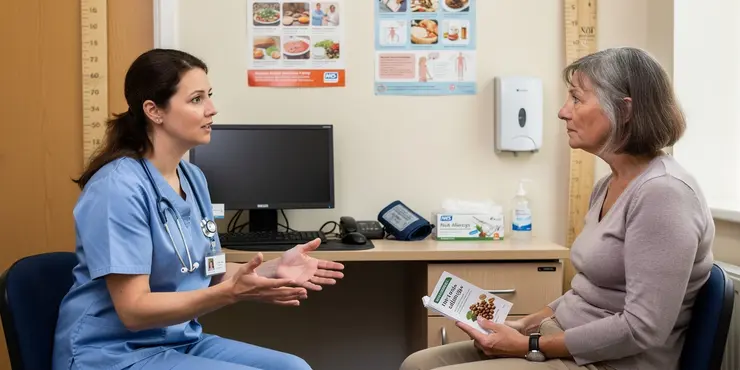
Are nut oils safe for people with nut allergies?
Relevance: 85%
-
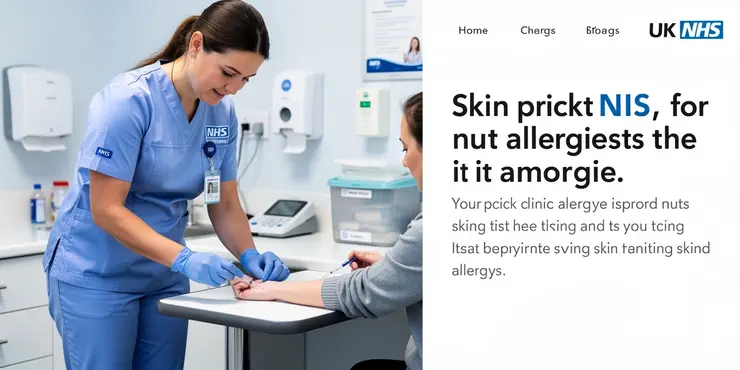
How is a nut allergy diagnosed?
Relevance: 85%
-
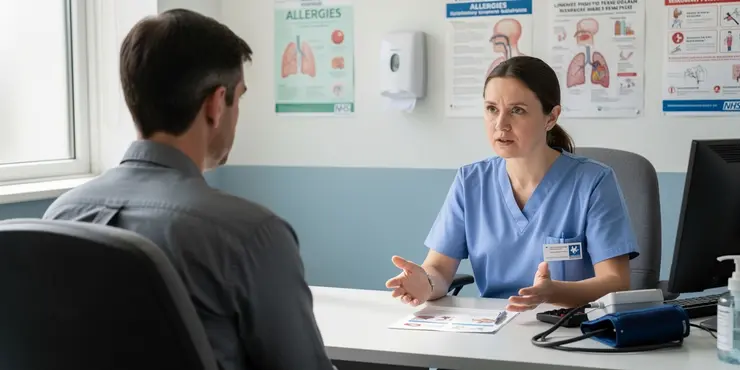
What are the symptoms of a nut allergy?
Relevance: 85%
-

What types of nuts can cause allergies?
Relevance: 82%
-

Can nut allergies develop later in life?
Relevance: 82%
-

What is the difference between a nut allergy and intolerance?
Relevance: 81%
-

What should I do if I think I have a nut allergy?
Relevance: 79%
-
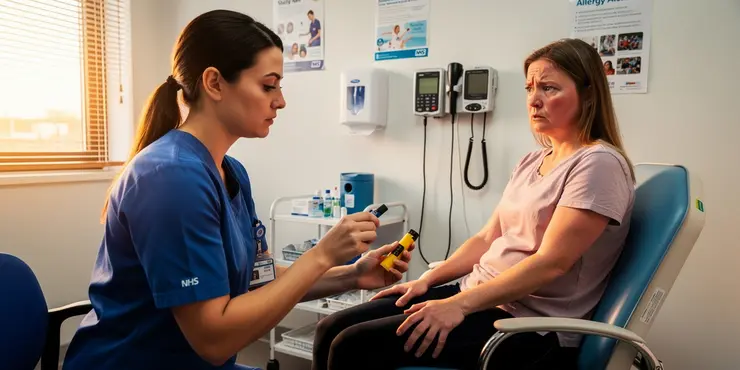
Is epinephrine the only treatment for severe nut allergy reactions?
Relevance: 73%
-

What should I tell my family and friends about my nut allergy?
Relevance: 69%
-

Can tree nuts and peanuts cause cross-reactions?
Relevance: 61%
-

How are food allergies managed in UK schools?
Relevance: 58%
-

Is it safe to eat foods labeled as 'may contain nuts'?
Relevance: 56%
-

What foods should I avoid if I have a nut allergy?
Relevance: 56%
-

Are there any recent treatments or research developments for nut allergies?
Relevance: 55%
-
How can I prevent cross-contamination with nuts in the kitchen?
Relevance: 55%
-
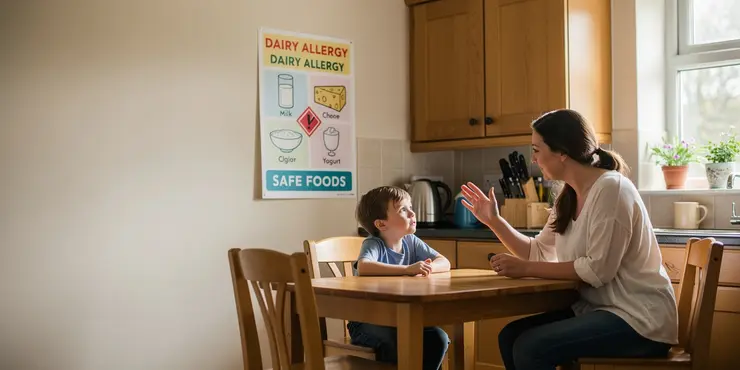
What are Dairy Allergies?
Relevance: 44%
-
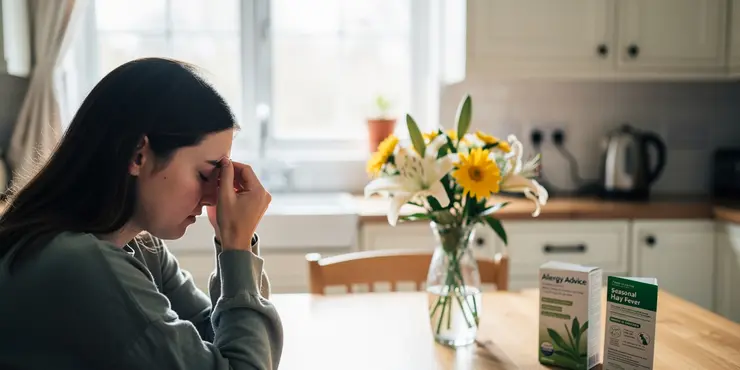
Dealing with Seasonal Allergies
Relevance: 44%
-

Can I get the COVID jab if I have allergies?
Relevance: 37%
-

Can patients with drug allergies still take heart disease medications?
Relevance: 36%
-
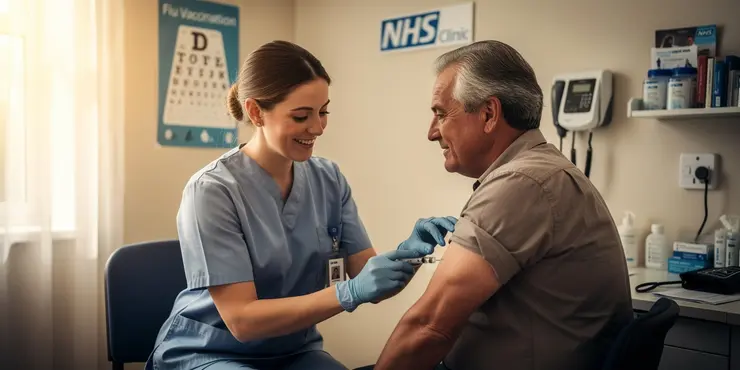
What if I have an egg allergy, can I still get the flu vaccine?
Relevance: 35%
-

Can children with nut allergies safely attend school?
Relevance: 35%
-

Can fiber help with weight management?
Relevance: 31%
-

Managing and treating your child's eczema
Relevance: 27%
-

What is the role of diet in managing heart failure?
Relevance: 27%
-
Can orange juice be allergenic?
Relevance: 26%
-

What foods can trigger nettle rash?
Relevance: 26%
-

How are special dietary requirements catered for in school meals?
Relevance: 26%
-

What is the role of potassium in managing blood pressure?
Relevance: 26%
-

Prolapse Management
Relevance: 24%
-

Can fiber help with weight management?
Relevance: 24%
-

What dietary changes can help manage Crohn's disease?
Relevance: 23%
-

Can diet affect eczema?
Relevance: 22%
-

What lifestyle changes can help manage sleep apnea?
Relevance: 22%
-

How to manage type 2 diabetes
Relevance: 22%
-

Understanding and Managing Respiratory Illnesses in Families
Relevance: 22%
-

Long COVID - Managing Breathlessness
Relevance: 21%
Understanding Nut Allergies
Nut allergies are a common type of food allergy that can cause serious and sometimes life-threatening reactions. In the UK, the prevalence of nut allergies has been increasing, making it crucial for affected individuals and their families to manage this condition effectively.
Diagnosis and Awareness
Diagnosis of a nut allergy typically involves a detailed medical history review and allergy testing, such as skin prick tests or blood tests. It is important for individuals to consult healthcare professionals for an accurate diagnosis. Awareness of nut allergies can help those affected to avoid allergens and educate peers, schools, and workplaces about the condition.
Allergen Avoidance
The primary approach to managing nut allergies is strict avoidance of nuts and products containing nuts. This requires careful reading of food labels, as nuts can be present in a wide range of products. In the UK, food labeling laws mandate that allergens, including nuts, are clearly stated on packaged foods, aiding consumers in making safe choices.
Emergency Preparedness
Individuals with nut allergies should be prepared for accidental exposure by carrying an adrenaline autoinjector, such as an EpiPen, at all times. It's essential to know how to use the device correctly and ensure it is within its expiration date. Family, friends, and colleagues should also be educated on how to recognize the symptoms of an allergic reaction and how to administer treatment.
School and Workplace Strategies
Schools and workplaces in the UK should have policies in place to support those with nut allergies. This includes nut-free zones, educational initiatives, and having staff trained in allergy response protocols. Clear communication with institutions about individual needs can enhance safety and inclusivity.
Nutrition and Lifestyle
Avoiding nuts should not compromise a healthy diet. Individuals can substitute other foods to obtain nutrients typically found in nuts, such as seeds and legumes. Consulting a dietitian can ensure nutritional needs are met without exposure to allergens. Additionally, some individuals may explore allergen immunotherapy with medical guidance to potentially desensitize the immune response to nuts over time.
Support and Resources
Various support groups and resources are available in the UK for those affected by nut allergies. Organizations such as Allergy UK and Anaphylaxis Campaign offer information, advocacy, and community support. Connecting with others who have similar experiences can provide valuable tips and emotional support.
What Are Nut Allergies?
Nut allergies mean some people get very sick if they eat nuts. This can be very dangerous. More people in the UK are getting nut allergies. So, it's important to know how to stay safe if you have one.
How Do You Know If You Have a Nut Allergy?
Doctors can check if you have a nut allergy by asking questions and doing tests. It's important to talk to a doctor to know for sure. Knowing about nut allergies helps people stay away from nuts and teaches friends and places like schools and work about it.
Staying Away from Nuts
To stay safe, people with nut allergies should not eat nuts or foods with nuts in them. Read the labels on food packages carefully. In the UK, labels must say if nuts are in the food. This helps you choose safe foods to eat.
Being Ready for Emergencies
People with nut allergies need to carry a special medicine called an adrenaline autoinjector, like an EpiPen. They should know how to use it and make sure it's not too old. Family and friends should know how to help if there is an allergic reaction.
Schools and Workplaces
Schools and workplaces should help people with nut allergies. They can have nut-free areas and teach everyone about allergies. Talking to your school or workplace about your needs can keep you safe.
Eating Well Without Nuts
You can stay healthy without eating nuts. Try seeds and beans for the same nutrients. A dietitian can help you find safe foods. Some people may also try special treatments to get less sensitive to nuts, but only if doctors say it’s okay.
Finding Help and Support
There are groups in the UK that help people with nut allergies. Allergy UK and Anaphylaxis Campaign give information and support. Meeting others with a nut allergy can give helpful tips and make you feel better.
Frequently Asked Questions
What is the first step in managing a nut allergy?
The first step in managing a nut allergy is obtaining an accurate diagnosis from an allergist.
How can I avoid exposure to nuts?
Read food labels carefully, avoid cross-contamination, and communicate your allergy when eating out.
What should I do if I unintentionally consume nuts?
Administer an epinephrine auto-injector immediately if symptoms are severe and seek medical help.
Is carrying an epinephrine auto-injector important?
Yes, always carry an epinephrine auto-injector if you have a nut allergy, as it is the first line of treatment for anaphylaxis.
Can nut allergies be outgrown?
Some children may outgrow peanut allergies, but tree nut allergies are often lifelong. Regular assessments by an allergist can provide guidance.
What are common symptoms of a nut allergy reaction?
Symptoms can include hives, difficulty breathing, swelling, and in severe cases, anaphylaxis.
Are there any treatments for nut allergies?
While there is no cure, oral immunotherapy is a treatment that may help desensitize individuals to allergens.
How can I ensure my child’s school is aware of their nut allergy?
Communicate with the school and develop an action plan. Ensure staff are trained to handle allergic reactions.
Can cooking remove the allergen proteins in nuts?
No, cooking does not eliminate allergen proteins in nuts, and they can still cause reactions.
Are all nuts equally allergenic?
Peanuts and tree nuts like walnuts and almonds are common allergens, but sensitivity can vary by individual.
Should I avoid foods labeled 'may contain nuts'?
Yes, it's safest to avoid products with such labels to reduce the risk of cross-contamination.
What role do antihistamines play in managing nut allergies?
Antihistamines can help ease mild allergic symptoms, but they are not a substitute for epinephrine in severe reactions.
How can restaurants help manage nut allergies?
Restaurants can ensure staff are trained in allergen awareness and are able to accommodate special dietary needs.
How can I raise awareness about nut allergies?
Educate friends, family, and peers about nut allergies and how to support those affected by them.
What should I do if a nut allergy reaction occurs when I am alone?
Administer your epinephrine immediately and seek emergency medical help by calling emergency services.
Is it important to wear medical identification for nut allergies?
Yes, wearing medical ID can alert others to your allergy in case of an emergency.
How can traveling with a nut allergy be made safer?
Plan ahead by researching airline policies, packing safe snacks, and informing travel staff of your allergy.
What should I tell friends and family about my nut allergy?
Educate them on what foods to avoid, signs of a reaction, and how to use your epinephrine auto-injector.
Can cross-contact occur with nuts?
Yes, cross-contact can happen if surfaces or utensils used for nuts are not properly cleaned before preparing other foods.
Where can I find more information on living with a nut allergy?
Resources such as FAAN, allergist consultations, and reputable medical websites provide valuable information.
What should you do first if you have a nut allergy?
The first step to dealing with a nut allergy is to see a special doctor. This doctor is called an allergist. They can tell you for sure if you have a nut allergy.
How can I stay away from nuts?
Here are some ways to stay safe from nuts:
- Read food labels carefully. Look for words like "nuts" or "peanuts".
- Ask about ingredients when eating out. Make sure there are no nuts in your food.
- Use special apps to check foods for nuts. They can help you make safe choices.
- Ask a grown-up for help if you are not sure. They can help you pick safe foods.
Look at food labels closely. Keep different foods apart so they don't mix. Tell people about your allergy when you eat at restaurants.
What should I do if I eat nuts by accident?
If you eat nuts and didn't mean to, here’s what you can do:
- Stay calm. Try not to worry.
- If you feel funny, like itchy or have trouble breathing, tell someone right away.
- You might need to see a doctor. An adult can help you with that.
You can also use tools like picture cards or an app to help explain how you feel. They can help you and others understand what's wrong.
Use an epinephrine pen right away if the person is very unwell. Call a doctor for help.
Why is it important to carry an epinephrine auto-injector?
If you have a nut allergy, always carry a special medicine called an epinephrine auto-injector. It helps you if you have a serious allergic reaction. This is very important.
Can children stop being allergic to nuts?
Some children can stop having nut allergies as they grow up. But it's important to ask a doctor to check if this has happened. Always be careful with nuts.
If you are worried about nut allergies, try these helpful tips:
- See a doctor or an allergy expert.
- Use allergy bracelets to show people what you are allergic to.
- Always read food labels to check for nuts.
- Carry medicine, like an EpiPen, for emergencies.
Some kids might stop being allergic to peanuts as they grow up. But allergies to tree nuts usually last forever. It's important to see a doctor who knows about allergies. They can help and give advice.
What happens if you are allergic to nuts?
If you are allergic to nuts, you might feel itchy, start sneezing, or get a rash. Your mouth and throat could feel funny or swell up. It might be hard to breathe or your tummy could hurt. If you feel like this, tell an adult fast.
You can carry a special pen, called an EpiPen, which helps in an emergency. Ask a doctor about wearing a bracelet that tells people you have an allergy.
Signs to look for are itchy bumps, trouble breathing, puffiness, and sometimes a scary reaction called anaphylaxis.
Can we make nut allergies better?
There is no way to make allergies go away completely, but there is a treatment called oral immunotherapy. This treatment can help people get used to the things they are allergic to so they have fewer allergic reactions.
How can I make sure my child's school knows about their nut allergy?
To help the school know about your child's nut allergy, you can:
- Tell the teacher and school nurse about the allergy.
- Give the school a doctor’s note or allergy plan.
- Ask the school to put up signs saying your child cannot have nuts.
- Check that the cafeteria and staff know about the allergy.
- Use stickers or bracelets that say "No Nuts" for your child.
- Have your child carry an EpiPen if the doctor says it is okay.
Try to talk with the school regularly to remind them and keep your child safe. Using simple tools like a calendar or a checklist can help you keep track of what you need to do.
Talk to the school and make a plan together. Make sure teachers know what to do if someone has an allergy.
Can cooking make nuts safe if you are allergic?
When you cook nuts, it does not make them safe for people with nut allergies.
If you have a nut allergy, do not eat nuts, even if they are cooked.
Ask a doctor or use allergy tests to help keep you safe.
No, cooking cannot stop nuts from causing allergies. The proteins that cause allergies are still there.
Do all nuts cause allergies the same way?
Some people can be allergic to peanuts and nuts like walnuts and almonds. But, not everyone is allergic in the same way.
Do I need to stay away from foods that say 'may contain nuts'?
If you are allergic to nuts, be careful with foods that say 'may contain nuts'. These foods might have a little bit of nuts in them. Even a tiny bit can make you sick.
Here are some tips to help you:
- Ask an adult for help if you are not sure about the food.
- Read the food label carefully.
- Use apps that help you check if food is safe.
- Always carry your medicine if you have a nut allergy.
Stay safe and ask for help if you need it!
Yes, it is safer to stay away from products with those labels. This helps to keep things clean and safe.
How do antihistamines help with nut allergies?
Antihistamines are medicines that can help if you have an allergy to nuts. If you eat nuts and your body reacts, these medicines can make the reaction less strong.
They work by blocking a natural chemical in your body called histamine. This chemical can cause sneezing, itching, and hives when you have an allergy.
If you have a nut allergy, it is important to have an adult with you when you take antihistamines. Always ask your doctor or pharmacist how to use them safely.
Helpful Idea: Have a plan and know what to do if you eat nuts by mistake. Carry your medicine with you and tell an adult if you feel unwell.
Antihistamines can help with small allergy problems, but they won't replace epinephrine if the allergy is really bad.
How can restaurants help people with nut allergies?
Restaurants can make sure people with nut allergies stay safe by doing a few things. Here’s how:
- Tell Customers: Put a note on the menu if dishes have nuts. This helps people know what is safe to eat.
- Train Staff: Teach the waiters and cooks about nut allergies. They should know what to do to keep people safe.
- Keep Food Separate: Use different tools for cooking food with nuts and food without nuts. This helps stop the mixing of nut and non-nut foods.
- Ask Questions: Encourage staff to ask customers if they have any allergies when they order food.
- Use Tools: Use apps or allergy cards to help communicate with customers who have allergies.
By doing these things, restaurants can make sure everyone has a safe and happy meal!
Restaurants can teach their staff about food allergies. This helps them understand and help people with special diets.
How can I tell people about nut allergies?
Do you want to help people learn about nut allergies? Here are some easy ways:
1. Talk to People: Share what you know about nut allergies with friends and family. Tell them what to look out for.
2. Make Posters: Create colorful posters with simple pictures and words. Put them up in places like schools or community centers.
3. Use Social Media: Ask a grown-up to help you post messages online. You can share facts and tips about nut allergies.
4. Read Books: Find books about allergies and read them together with others. This helps everyone understand better.
5. Ask for Help: You can ask your teacher to talk about allergies in class.
These are some ways to help. It is important to keep everyone safe and healthy. Keep talking about nut allergies.
Teach your friends, family, and others about nut allergies. Show them how to help people who have nut allergies.
What do I do if I have a nut allergy reaction and I am by myself?
Use your medicine right away and call 911 for help.
Should you wear a medical ID if you have a nut allergy?
If you have a nut allergy, wearing a medical ID is important. It tells people about your allergy if you can't talk. This can help keep you safe.
Here are some helpful tools and tips:
- Wear a bracelet or necklace with your allergy information.
- Tell people around you about your nut allergy.
- Carry an allergy card in your wallet or bag.
These tools can help others know what to do if you have an allergic reaction.
Yes, wearing a medical ID can help others know about your allergy if there is an emergency.
How can traveling with a nut allergy be safer?
If you have a nut allergy, here are some steps to help you stay safe when traveling:
- Tell people: Let the airline staff, hotel, and restaurant workers know about your allergy.
- Carry your medicine: Always have your medicine with you, like an EpiPen or allergy pills.
- Read labels: Check food labels for nuts before you eat anything.
- Research: Learn about safe places to eat where you are traveling.
- Use translation cards: Use cards that explain your allergy in the local language.
These tips can help you avoid nuts and have a safer trip.
Get ready before you travel. Find out what the airline rules are. Pack snacks that are safe for you. Tell the travel staff about your allergy.
What should I tell my friends and family about my nut allergy?
1. Tell them you can't eat nuts.
2. Say that nuts can make you very sick.
3. Ask them to check if there are nuts in food before you eat.
4. Let them know you might need help if you accidentally eat nuts.
5. You can use pictures of nuts to show which foods are not safe.
Teach them about which foods to stay away from, how to spot an allergy reaction, and how to use your epinephrine pen if they need to help you.
Can nuts touch other foods?
Sometimes nuts can touch other foods. This is called cross-contact. Cross-contact means a bit of nuts might get on other foods.
To help stay safe, here are some tips:
- Keep nuts in a separate place.
- Use clean tools and plates for all food.
- Wash your hands if you touch nuts.
Yes, nuts can get on other food if things like tables or spoons are not cleaned well after using them with nuts.
Where can I find more information if I have a nut allergy?
There are some helpful places where you can learn about allergies. You can talk to a doctor who understands allergies, visit trusted health websites, or check out FAAN. They have good information that can help you.
Useful Links
This website offers general information and is not a substitute for professional advice.
Always seek guidance from qualified professionals.
If you have any medical concerns or need urgent help, contact a healthcare professional or emergency services immediately.
Some of this content was generated with AI assistance. We’ve done our best to keep it accurate, helpful, and human-friendly.
- Ergsy carfully checks the information in the videos we provide here.
- Videos shown by Youtube after a video has completed, have NOT been reviewed by ERGSY.
- To view, click the arrow in centre of video.
- Most of the videos you find here will have subtitles and/or closed captions available.
- You may need to turn these on, and choose your preferred language.
- Go to the video you'd like to watch.
- If closed captions (CC) are available, settings will be visible on the bottom right of the video player.
- To turn on Captions, click settings .
- To turn off Captions, click settings again.
More Items From Ergsy search
-

How can nut allergies be managed?
Relevance: 100%
-

What are Nut Allergies?
Relevance: 92%
-

Is there a cure for nut allergies?
Relevance: 91%
-

Can nut allergies be outgrown?
Relevance: 87%
-

Are nut oils safe for people with nut allergies?
Relevance: 85%
-

How is a nut allergy diagnosed?
Relevance: 85%
-

What are the symptoms of a nut allergy?
Relevance: 85%
-

What types of nuts can cause allergies?
Relevance: 82%
-

Can nut allergies develop later in life?
Relevance: 82%
-

What is the difference between a nut allergy and intolerance?
Relevance: 81%
-

What should I do if I think I have a nut allergy?
Relevance: 79%
-

Is epinephrine the only treatment for severe nut allergy reactions?
Relevance: 73%
-

What should I tell my family and friends about my nut allergy?
Relevance: 69%
-

Can tree nuts and peanuts cause cross-reactions?
Relevance: 61%
-

How are food allergies managed in UK schools?
Relevance: 58%
-

Is it safe to eat foods labeled as 'may contain nuts'?
Relevance: 56%
-

What foods should I avoid if I have a nut allergy?
Relevance: 56%
-

Are there any recent treatments or research developments for nut allergies?
Relevance: 55%
-
How can I prevent cross-contamination with nuts in the kitchen?
Relevance: 55%
-

What are Dairy Allergies?
Relevance: 44%
-

Dealing with Seasonal Allergies
Relevance: 44%
-

Can I get the COVID jab if I have allergies?
Relevance: 37%
-

Can patients with drug allergies still take heart disease medications?
Relevance: 36%
-

What if I have an egg allergy, can I still get the flu vaccine?
Relevance: 35%
-

Can children with nut allergies safely attend school?
Relevance: 35%
-

Can fiber help with weight management?
Relevance: 31%
-

Managing and treating your child's eczema
Relevance: 27%
-

What is the role of diet in managing heart failure?
Relevance: 27%
-
Can orange juice be allergenic?
Relevance: 26%
-

What foods can trigger nettle rash?
Relevance: 26%
-

How are special dietary requirements catered for in school meals?
Relevance: 26%
-

What is the role of potassium in managing blood pressure?
Relevance: 26%
-

Prolapse Management
Relevance: 24%
-

Can fiber help with weight management?
Relevance: 24%
-

What dietary changes can help manage Crohn's disease?
Relevance: 23%
-

Can diet affect eczema?
Relevance: 22%
-

What lifestyle changes can help manage sleep apnea?
Relevance: 22%
-

How to manage type 2 diabetes
Relevance: 22%
-

Understanding and Managing Respiratory Illnesses in Families
Relevance: 22%
-

Long COVID - Managing Breathlessness
Relevance: 21%


